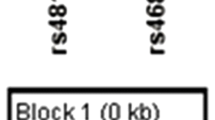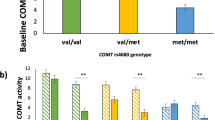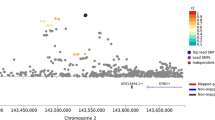Abstract
Catechol-O-methyltransferase (COMT) is an enzyme which has a crucial role in the metabolism of dopamine. It has been suggested that a common functional genetic polymorphism in the COMT gene, which results in 3 to 4-fold difference in COMT enzyme activity,1,2 may contribute to the etiology of mental disorders such as bipolar disorder and alcoholism.1 Since ethanol-induced euphoria is associated with the rapid release of dopamine in limbic areas, it is conceivable that subjects who inherit the allele encoding the low activity COMT variant would have a relatively low dopamine inactivation rate, and therefore would be more vulnerable to the development of ethanol dependence. The aim of this study was to test this hypothesis among type 1 (late-onset) alcoholics. The COMT polymorphism was determined in two independent male late onset (type 1) alcoholic populations in Turku (n = 67) and Kuopio (n = 56). The high (H) and low (L) activity COMT genotype and allele frequencies were compared with previously published data from 3140 Finnish blood donors (general population) and 267 race- and gender-matched controls. The frequency of low activity allele (L) was markedly higher among the patients both in Turku (P = 0.023) and in Kuopio (P = 0.005) when compared with the general population. When all patients were compared with the general population (blood donors), the difference was even more significant (P = 0.0004). When genotypes of all alcoholics (n = 123) were compared with genotypes of matched controls, the odds ratio (OR) for alcoholism for those subjects having the LL genotype vs those with HH genotype was 2.51, 95% CI 1.22–5.19, P = 0.006. Also, L allele frequency was significantly higher among alcoholics when compared with controls (P = 0.009). The estimate for population etiological (attributable) fraction for the LL genotype in alcoholism was 13.3% (95% CI 2.3–25.7%). The results indicate that the COMT polymorphism contributes significantly to the development of late-onset alcoholism.
This is a preview of subscription content, access via your institution
Access options
Subscribe to this journal
Receive 12 print issues and online access
$259.00 per year
only $21.58 per issue
Buy this article
- Purchase on Springer Link
- Instant access to full article PDF
Prices may be subject to local taxes which are calculated during checkout
Similar content being viewed by others
Author information
Authors and Affiliations
Corresponding author
Rights and permissions
About this article
Cite this article
Tiihonen, J., Hallikainen, T., Lachman, H. et al. Association between the functional variant of the catechol-O-methyltransferase (COMT) gene and type 1 alcoholism. Mol Psychiatry 4, 286–289 (1999). https://doi.org/10.1038/sj.mp.4000509
Received:
Revised:
Accepted:
Published:
Issue Date:
DOI: https://doi.org/10.1038/sj.mp.4000509
Keywords
This article is cited by
-
Catechol-O-methyltransferase (COMT) Val158Met Polymorphism and Susceptibility to Alcohol Dependence
Indian Journal of Clinical Biochemistry (2021)
-
Influence of dopamine-related genes on craving, impulsivity, and aggressiveness in Korean males with alcohol use disorder
European Archives of Psychiatry and Clinical Neuroscience (2021)
-
COMT Associations with Disordered Gambling and Drinking Measures
Journal of Gambling Studies (2015)
-
Comprehensive interrogation of CpG island methylation in the gene encoding COMT, a key estrogen and catecholamine regulator
BMC Medical Genomics (2014)
-
Peter Riederer “70th birthday” Neurobiological foundations of modern addiction treatment
Journal of Neural Transmission (2013)



